疑问句总结
疑问句知识点归纳
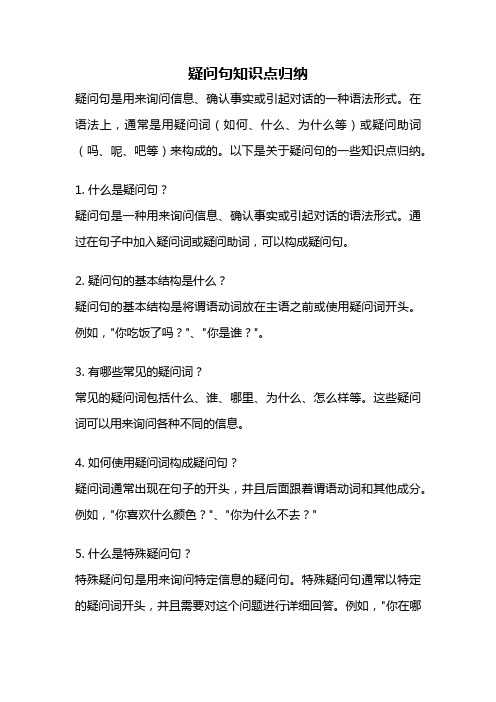
疑问句知识点归纳疑问句是用来询问信息、确认事实或引起对话的一种语法形式。
在语法上,通常是用疑问词(如何、什么、为什么等)或疑问助词(吗、呢、吧等)来构成的。
以下是关于疑问句的一些知识点归纳。
1. 什么是疑问句?疑问句是一种用来询问信息、确认事实或引起对话的语法形式。
通过在句子中加入疑问词或疑问助词,可以构成疑问句。
2. 疑问句的基本结构是什么?疑问句的基本结构是将谓语动词放在主语之前或使用疑问词开头。
例如,"你吃饭了吗?"、"你是谁?"。
3. 有哪些常见的疑问词?常见的疑问词包括什么、谁、哪里、为什么、怎么样等。
这些疑问词可以用来询问各种不同的信息。
4. 如何使用疑问词构成疑问句?疑问词通常出现在句子的开头,并且后面跟着谓语动词和其他成分。
例如,"你喜欢什么颜色?"、"你为什么不去?"5. 什么是特殊疑问句?特殊疑问句是用来询问特定信息的疑问句。
特殊疑问句通常以特定的疑问词开头,并且需要对这个问题进行详细回答。
例如,"你在哪里工作?"、"你是怎么学会弹吉他的?"6. 什么是一般疑问句?一般疑问句是用来询问肯定或否定的事实的疑问句。
一般疑问句通常以动词开头,并且可以通过肯定或否定的回答来回答问题。
例如,"你喜欢吃苹果吗?"、"他会来吗?"7. 什么是选择疑问句?选择疑问句是用来询问两个或多个选项之间的选择的疑问句。
选择疑问句通常以或者、还是等词开头,并且需要从给定的选项中选择一个选项来回答问题。
例如,"你想要茶还是咖啡?"、"你是喜欢夏天还是冬天?"8. 疑问句可以用来引起对话吗?是的,疑问句通常用来引起对话或启动一段对话。
通过提出问题,可以让对方参与到对话中,进一步交流和沟通。
9. 疑问句可以用来确认事实吗?是的,疑问句可以用来确认事实或确认某个陈述的正确性。
疑问句要素技巧总结
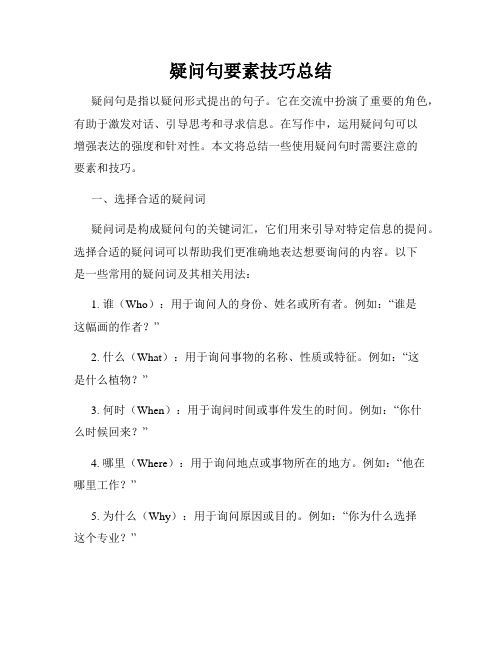
疑问句要素技巧总结疑问句是指以疑问形式提出的句子。
它在交流中扮演了重要的角色,有助于激发对话、引导思考和寻求信息。
在写作中,运用疑问句可以增强表达的强度和针对性。
本文将总结一些使用疑问句时需要注意的要素和技巧。
一、选择合适的疑问词疑问词是构成疑问句的关键词汇,它们用来引导对特定信息的提问。
选择合适的疑问词可以帮助我们更准确地表达想要询问的内容。
以下是一些常用的疑问词及其相关用法:1. 谁(Who):用于询问人的身份、姓名或所有者。
例如:“谁是这幅画的作者?”2. 什么(What):用于询问事物的名称、性质或特征。
例如:“这是什么植物?”3. 何时(When):用于询问时间或事件发生的时间。
例如:“你什么时候回来?”4. 哪里(Where):用于询问地点或事物所在的地方。
例如:“他在哪里工作?”5. 为什么(Why):用于询问原因或目的。
例如:“你为什么选择这个专业?”6. 如何(How):用于询问方式、方法或情况。
例如:“你如何学好英语?”7. 多少(How much/many):用于询问数量或程度。
例如:“你有多少兄弟姐妹?”8. 是否(Whether):用于询问是否发生或存在。
例如:“你知道是否有会议?”9. 哪个(Which):用于询问选择或比较。
例如:“你想要哪个颜色的T恤?”二、调整语序和语气疑问句的语序和语气也是需要注意的要素。
以下是一些常见的调整技巧:1. 把陈述句转换为疑问句:将陈述句的语序调整为疑问句的语序,一般是把谓语动词或助动词移至主语之前。
例如:“你喜欢这本书。
”可以转换为“你喜欢这本书吗?”2. 加强语气:在疑问句中使用加强语气可以表达更强烈的疑问或惊讶。
例如:“你竟然不知道这件事?”3. 保持客观:在疑问句中避免表达个人观点或偏见,保持客观中立的态度。
例如:“在这种情况下,应该采取怎样的行动?”三、避免双关疑问句双关疑问句是一种采用疑问句形式表达反意的修辞手法。
尽管它可以营造一种戏剧性或幽默的氛围,但在正式的写作中应谨慎使用,以免造成歧义或误解。
特殊疑问句总结英语
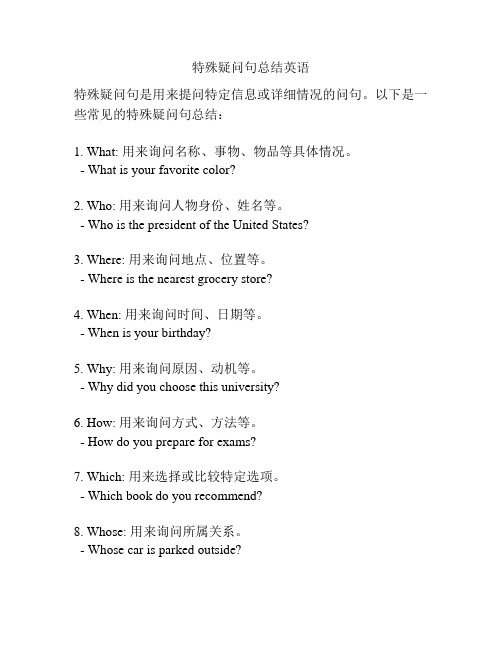
特殊疑问句总结英语特殊疑问句是用来提问特定信息或详细情况的问句。
以下是一些常见的特殊疑问句总结:1. What: 用来询问名称、事物、物品等具体情况。
- What is your favorite color?2. Who: 用来询问人物身份、姓名等。
- Who is the president of the United States?3. Where: 用来询问地点、位置等。
- Where is the nearest grocery store?4. When: 用来询问时间、日期等。
- When is your birthday?5. Why: 用来询问原因、动机等。
- Why did you choose this university?6. How: 用来询问方式、方法等。
- How do you prepare for exams?7. Which: 用来选择或比较特定选项。
- Which book do you recommend?8. Whose: 用来询问所属关系。
- Whose car is parked outside?9. Whom: 用来询问宾语或介词后面的人。
- Whom did you invite to the party?10. How much: 用来询问不可数名词的数量。
- How much does a ticket cost?11. How many: 用来询问可数名词的数量。
- How many siblings do you have?12. How often: 用来询问频率。
- How often do you go to the gym?13. How long: 用来询问时间长度或物体长度。
- How long have you been learning English?14. How far: 用来询问距离。
- How far is it from here to the airport?。
特殊疑问句的引导词与句型总结
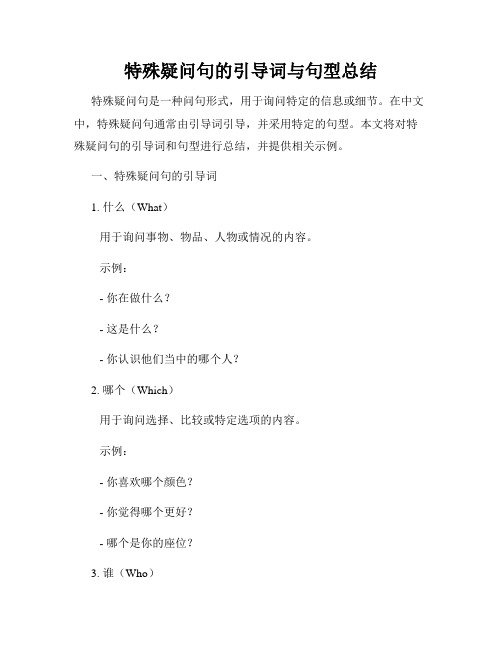
特殊疑问句的引导词与句型总结特殊疑问句是一种问句形式,用于询问特定的信息或细节。
在中文中,特殊疑问句通常由引导词引导,并采用特定的句型。
本文将对特殊疑问句的引导词和句型进行总结,并提供相关示例。
一、特殊疑问句的引导词1. 什么(What)用于询问事物、物品、人物或情况的内容。
示例:- 你在做什么?- 这是什么?- 你认识他们当中的哪个人?2. 哪个(Which)用于询问选择、比较或特定选项的内容。
示例:- 你喜欢哪个颜色?- 你觉得哪个更好?- 哪个是你的座位?3. 谁(Who)用于询问人物或人群的身份、职业、关系等内容。
示例:- 谁是你最好的朋友?- 你认识这个演员吗?- 谁会参加会议?4. 哪里(Where)用于询问地点、位置或行动发生的地点。
示例:- 你去了哪里?- 这是哪里?- 你们后天要去哪里旅游?5. 什么时候(When)用于询问时间、日期或事件发生的时间。
示例:- 你什么时候开始工作?- 什么时候是你的生日?- 他们什么时候回来?6. 为什么(Why)用于询问原因、动机或解释。
示例:- 你为什么不去参加聚会?- 为什么她哭了?- 你为什么选择这个职业?7. 怎么样(How)用于询问方式、方法或情况的描述。
示例:- 你怎么样学习英语的?- 这个问题怎么解决?- 你怎么样度过周末?二、特殊疑问句的句型1. Subject + Verb + 什么/哪个/谁/哪里/什么时候/为什么/怎么样示例:- 你在做什么?- 他去了哪里?- 你为什么选择这个职业?2. 什么/哪个/谁/哪里/什么时候/为什么/怎么样 + Verb + Object?示例:- 你喜欢哪个颜色?- 哪个是你的座位?- 你们后天要去哪里旅游?3. 什么/哪个/谁/哪里/什么时候/为什么/怎么样 + Verb + ?示例:- 你认识他们当中的哪个人?- 哪个是你的座位?- 谁会参加会议?4. 什么/哪个/谁/哪里/什么时候/为什么/怎么样 + Verb + 宾语 + ?示例:- 你怎么样学习英语的?- 这个问题怎么解决?- 你为什么不去参加聚会?总结:特殊疑问句在中文中起到了很重要的作用,通过特殊疑问句的引导词和句型,我们可以准确地询问特定的信息或细节。
一般疑问句用法总结
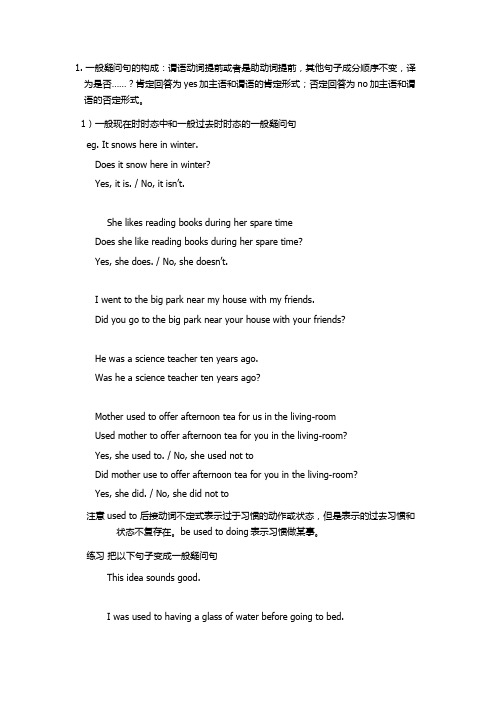
1. 一般疑问句的构成:谓语动词提前或者是助动词提前,其他句子成分顺序不变,译为是否……?肯定回答为yes加主语和谓语的肯定形式;否定回答为no加主语和谓语的否定形式。
1)一般现在时时态中和一般过去时时态的一般疑问句eg. It snows here in winter.Does it snow here in winter?Yes, it is. / No, it isn’t.She likes reading books during her spare timeDoes she like reading books during her spare time?Yes, she does. / No, she doesn’t.I went to the big park near my house with my friends.Did you go to the big park near your house with your friends?He was a science teacher ten years ago.Was he a science teacher ten years ago?Mother used to offer afternoon tea for us in the living-roomUsed mother to offer afternoon tea for you in the living-room?Yes, she used to. / No, she used not toDid mother use to offer afternoon tea for you in the living-room?Yes, she did. / No, she did not to注意used to 后接动词不定式表示过于习惯的动作或状态,但是表示的过去习惯和状态不复存在。
一般疑问句和特殊疑问句知识点总结

一般疑问句和特殊疑问句知识点总结一、一般疑问句。
1. 定义。
- 一般疑问句是用来询问某事是否属实,需要用“是(yes)”或“否(no)”来回答的疑问句。
例如:“Are you a student?”(你是一名学生吗?)2. 结构。
- be动词(am/is/are/was/were)开头的一般疑问句。
- 当句子中有be动词时,将be动词提到句首,句末加问号,句子中的主语如果是第一人称要变为第二人称。
- 肯定句:I am a teacher.(我是一名教师。
)- 一般疑问句:Are you a teacher?(你是一名教师吗?)- 其回答形式为:Yes, 主语+be动词. / No, 主语+be动词+not.- 例如:Are you from China? Yes, I am. / No, I'm not.- 助动词(do/does/did)开头的一般疑问句。
- 当句子中的谓语动词是实义动词,且句子时态为一般现在时(主语不是第三人称单数用do,主语是第三人称单数用does)或一般过去时(用did)时,将助动词提到句首,动词恢复原形,句末加问号。
- 肯定句:He likes apples.(他喜欢苹果。
)- 一般疑问句:Does he like apples?(他喜欢苹果吗?)- 肯定句:I played football yesterday.(我昨天踢足球了。
)- 一般疑问句:Did you play football yesterday?(你昨天踢足球了吗?)- 回答形式为:Yes, 主语+do/does/did. / No, 主语+don't/doesn't/didn't.- 例如:Do they go to school by bike? Yes, they do. / No, they don't.- 情态动词(can/could/may/must等)开头的一般疑问句。
英语四种疑问句的用法归纳
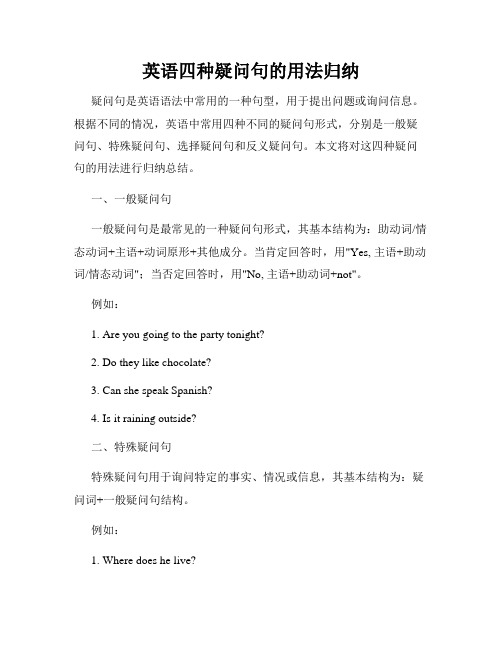
英语四种疑问句的用法归纳疑问句是英语语法中常用的一种句型,用于提出问题或询问信息。
根据不同的情况,英语中常用四种不同的疑问句形式,分别是一般疑问句、特殊疑问句、选择疑问句和反义疑问句。
本文将对这四种疑问句的用法进行归纳总结。
一、一般疑问句一般疑问句是最常见的一种疑问句形式,其基本结构为:助动词/情态动词+主语+动词原形+其他成分。
当肯定回答时,用"Yes, 主语+助动词/情态动词";当否定回答时,用"No, 主语+助动词+not"。
例如:1. Are you going to the party tonight?2. Do they like chocolate?3. Can she speak Spanish?4. Is it raining outside?二、特殊疑问句特殊疑问句用于询问特定的事实、情况或信息,其基本结构为:疑问词+一般疑问句结构。
例如:1. Where does he live?2. What time is the meeting?3. How often do you exercise?4. Why did she quit her job?常用的特殊疑问词包括:who(谁)、what(什么)、when(什么时候)、where(在哪里)、why(为什么)、how(如何)、which (哪一个)等。
三、选择疑问句选择疑问句用于在给出多个选项时进行选择,其基本结构为:是否+助动词/情态动词+动词原形+其他成分。
例如:1. Would you like tea or coffee?2. Do you prefer the beach or the mountains?3. Will you go by car or by train?选择疑问句中常用的短语包括:or(或者)、either... or...(要么...要么...)、neither... nor...(既不...也不...)等。
疑问句知识点总结

疑问句知识点总结疑问句是一种用来提出问题或询问信息的句子,通常以疑问代词或疑问词开头。
疑问句在日常交流中应用广泛,能够帮助人们获取所需的信息,表达好奇、疑惑或不确定的情绪。
疑问句的构成方式多样,包括倒装句、特殊疑问句和一般疑问句等。
下面将从这几个方面对疑问句的知识点进行总结。
一、倒装句倒装句是指将谓语动词或其它成分提前,主语放在谓语动词之后的句子结构。
在疑问句中,倒装句常常用于强调或转折的语境中。
常见的情况包括以下几种:1. 以“here, there, in, out, up, down”等副词开头的句子。
例如:Here comes the bus.(车来了。
)There goes the bell.(铃响了。
)2. 以表示方向的短语或副词开头的句子。
例如:Out rushed the children.(孩子们冲了出来。
)Up jumped the cat.(猫跳了起来。
)3. 表示状态、感叹或疑问的句子。
例如:Never had I seen such a beautiful sunset.(我从未见过如此美丽的日落。
)So dark is the night.(夜色如此黑)。
4. 否定词位于句首的句子。
例如:Not until last year did I realize the importance of health.(直到去年我才意识到健康的重要性。
)5. 以连词或副词短语引导的句子。
例如:Little did she know that she was being watched.(她小小的时候并不知道她正在被监视。
)Seldom does he go to the cinema.(他很少去电影院。
)倒装句的运用需要根据具体语境进行判断,同时也需要注意谓语动词的形式和语序的变化。
二、特殊疑问句特殊疑问句是以特殊疑问词开头的问句,用以询问特定信息。
特殊疑问词包括what, where, when, why, who, how等。
疑问句语序技巧总结

疑问句语序技巧总结在汉语中,疑问句是一种用来提问的句型,通常以疑问代词或疑问副词引导。
正确使用疑问句的语序可以更加准确地表达自己的疑问或询问对方的意见。
本文将总结一些常见的疑问句语序技巧,帮助读者提高写作和表达的能力。
一、一般疑问句语序1. 主谓疑问句:将动词放在主语前,没有人称代词时需加上人称代词。
例如:"Do you like ice cream?"(你喜欢冰淇淋吗?)"Are they coming to the party?"(他们要来参加派对吗?)2. 动词短语疑问句:将助动词或情态动词放在句首,其后跟原句的主语和动词原形。
例如:"Can she play the piano?"(她会弹钢琴吗?)"Could you lend me your pen?"(你能借给我你的笔吗?)3. 特殊疑问句:以特殊疑问词引导,疑问词常包括:谁(Who)、什么(What)、何时(When)、哪里(Where)、为什么(Why)、怎么样(How)等。
例如:"Where did you go last weekend?"(上周末你去哪里了?)"When will the concert start?"(音乐会什么时候开始?)二、反义疑问句语序反义疑问句是由两个部分组成,前面是陈述句,后面是一个疑问句。
它常用于提出对陈述句的确认或期待对方的回答。
1. 对于肯定句:将否定词或短语放在陈述句之后,否定词一般是与主句的主谓一致。
例如:"It's a nice day, isn't it?"(天气很好,是吗?)"You can swim, can't you?"(你会游泳,对吗?)2. 对于否定句:将肯定词或短语放在陈述句之后,肯定词一般是与主句的主谓一致。
一般、特殊疑问句语法总结

一般、特殊疑问句语法总结Be 动词包括:am, is, are.记住顺口溜:我(I)用am, 你(You)用are, is 跟着他(He)她(She)它(It).另外,am和is表示单数概念,are表示复数概念。
一般疑问句一、Be动词开头引导:1.---Is it a duck? 它是一只鸭子吗?---Yes, it is. / No, it isn’t. 是的,它是。
/ 不,它不是。
2.---Are you Jenny? 你是Jenny吗?---Yes, I am. / No, I am not. 是的,我是。
/ 不,我不是。
3.---Am I right? 我对吗?---Yes, you are. / No, you are not. 是的,你是对的。
/ 不,你不对。
二、情态动词Can 开头引导:1.---Can you dance? 你会跳舞吗?---Yes, I can. / No, I can’t. 是的,我会。
/ 不,我不会。
2.---Can it fly? 它会飞吗?---Yes, it can. / No, it can’t. 是的,它会。
/ 不,它不会。
三、助动词Do开头引导:---Do you like the cat ? 你喜欢猫吗?---Yes, I do. / No, I don’t. 是的,我喜欢。
/ 不,我不喜欢。
四、总结一般疑问句特点:1. Be 动词、情态动词、助动词开头,首字母大写。
2. 句末标点是问号。
3. 答语都先回答Yes或No。
五、例外情况:(体现在or这个单词)1.---Is it long or short? 它长还是短?---It’s long. / It’s short. 它长。
/ 它短。
2.---Are you happy or sad? 你是开心还是难过?---I’m happy. / I’m sad. 我开心。
/ 我难过。
六、总结选择疑问句特点:1. or :“或者,还是”。
总结疑问句基本知识点归纳

总结疑问句基本知识点归纳总结疑问句基本知识点归纳疑问句是语言中一个重要的句式,用于提出问题、询问信息或引起对话。
疑问句的使用需要掌握一些基本知识点,包括句法结构、语法规则和语义规则等。
下面将对疑问句的基本知识点进行归纳总结。
1. 疑问句的句法结构疑问句的句法结构与陈述句有所不同,一般由特殊疑问词/短语开头,或通过翻转主谓语序来构成。
特殊疑问词/短语包括什么、哪里、怎么样、为什么等,在句中充当疑问句的主语、宾语、状语等成分。
例如:- 你是谁?(特殊疑问词在句末)- 你喜欢什么颜色?(特殊疑问词在句中)- 你要去哪里旅行?(特殊疑问词在句首)- 你为什么不去参加派对?(特殊疑问词在句中)2. 疑问句的语法规则疑问句的语法规则包括普通疑问句、反义疑问句和选择疑问句等。
- 普通疑问句:一般在陈述句的基础上,将陈述句的语序进行翻转。
例如,“你喜欢看电影吗?”- 反义疑问句:通过在陈述句的末尾加上一个与之相对的简短问句表示反义疑问。
例如,“你喜欢看电影,对不对?”- 选择疑问句:用于提出两个或多个选择,通过特殊疑问词/短语来引导选择。
例如,“你想要咖啡还是茶?”、“你会弹钢琴还是吉他?”等。
3. 疑问句的语义规则除了句法结构和语法规则外,疑问句的语义规则也需要注意。
语义规则指的是疑问句中所提问的内容和意义。
- 是非问句:用于对某种情况、陈述或观点是否属实进行提问。
例如,“你是中国人吗?”、“你是不是很累?”等。
- 选择问句:用于询问选择关系,对限定范围内进行选择。
例如,“你喜欢吃苹果还是香蕉?”、“你要去哪个城市旅行?”等。
- 信息问句:用于询问具体信息、细节或逻辑关系。
例如,“你在哪里工作?”、“你是怎么学习英语的?”等。
综上所述,疑问句是语言中常用的句式之一,它通过疑问词/短语和翻转语序等方式来表达提问的目的。
在使用疑问句时,需要注意句法结构、语法规则和语义规则等方面的要求。
熟练掌握疑问句的基本知识点,将有助于我们更好地表达自己的问题、获取信息和加强与他人的沟通。
特殊疑问句

5、I’m in Class One,Grade Seven. 6、I’m in Grade Seven. 7、It’s an eraser. 8、It’s a map.(使用this) 9、E-R-A-S-E-R,eraser.
9、问那个用英语怎么说: What’s that in English?It’s a map. 10、问如何拼写单词: How do you spell it? E-R-A-S-E-R,eraser. Can you spell it? Yes.M-A-P,map.
对划线部分提问: 1、Nancy is nineteen. ___ ___ is Nancy? 2、He is in Class Five. ___ ___ is he in? 3、That is Han Mei. ___ is that? 4、Yukio is from Japan. ___ ___ Yukio from?
5、He is Tom. ______ he? 6、My telephone number is (010)56896655. ___ __telephone number? 7、They are Jim and Bill. ___ __they?
自我测试ቤተ መጻሕፍቲ ባይዱ
对划线部分提问: 1、My name is Nacy. 2、I’m from China. 3、They are Maria and Jane. 4、It’s 0373-453800.
特殊疑问句总结
1、问身体状况: How are you?Fine,thanks./I’m OK. 2、问名字: What’s your name? My name is Kangkang. 3、问来自哪个国家: Where are you from?I’m from China. 4、问他们是谁: Who are they?They are Maria and Jane. 5、问电话号码: What’s your telephone number?It’s0373453800.
特殊疑问句用法总结

特殊疑问句用法总结
1. 哎呀,特殊疑问句不就是用来问各种具体信息的嘛!比如“你多大啦?”这就是在问年龄呀!
2. 嘿,特殊疑问句就像是一把钥匙,能打开各种知识的大门呢!像“这是什么东西?”就是在寻求答案呀!
3. 哇塞,特殊疑问句可太有用啦!像“你在哪里工作?”不就能知道对方的工作地点嘛!
4. 哟呵,特殊疑问句能让我们快速了解好多事情呢,“他为什么这么做?”这不就是在探究原因嘛!
5. 哎呀呀,特殊疑问句真的很关键呀!“今天星期几?”这一问不就清楚日期啦!
6. 嘿呀,特殊疑问句就像个神奇的法宝,“你的电话号码是多少?”轻松问到重要信息!
7. 哇哦,特殊疑问句可是无处不在呀,“那本书叫什么名字?”这不就是想知道书名嘛!
8. 哈哈,特殊疑问句用处多多呀,“你喜欢什么颜色?”能了解对方的喜好呢!
9. 哎哟喂,特殊疑问句很厉害的哟,“她什么时候回来?”想知道她的归期呀!
10. 嘿嘿,特殊疑问句简直太妙啦!“这辆车多少钱?”直接问到关键的价格信息呢!
我的观点结论就是:特殊疑问句在日常生活中超级实用,能帮我们快速获取各种我们想知道的信息,一定要好好掌握呀!。
疑问句大总结

特殊疑问句:以疑问代词或疑问副词开头,提出疑问的句子。 它的基本结构是:特殊疑问词+一般疑问句语序。 但是如果疑问词在句子中作主语或作主语的定语,就用特殊疑问 词+陈述句语序。常用的疑问词有:what, who(whom), whose,which, when, where, how, why等,回答时针对问句中 的代词和副词来回答,不用yes或no来回答。
• 7)对方式或程度等提出疑问,用疑问词How。 • go by bike very much • 8)对数量提出疑问,疑问词为How many,要注 意how many必须跟名词的复数形式。 • two hundred sheep→How many sheep • 9)对价格提出疑问,疑问词用How much。 • I paid fifty yuan for the sweater. • ______ ______ did you pay for the sweater? • 10)对时间长度提出疑问,疑问词应用How long。 • I've worked in that factory for two years. (划线 提问) • ______ _____ _______ you worked in that factory?
Eg3. We read English every morning. → Do you read English every morning? Eg4. Tom’s father listens to English on the radio every evening. →Does Tom’s father listen to English on the radio every evening?
1、第一家族:含be动词或情态动词的句子 秘诀:一调二改三问号 一调:即把句中的be或情态动词调到主语前; 二改:改换主语称谓,即将句中的主语I\my\mines\we\our\ours 等第一人称分别改为相应的第二人称you\your\ yours等;
初中疑问句与特殊疑问句总结
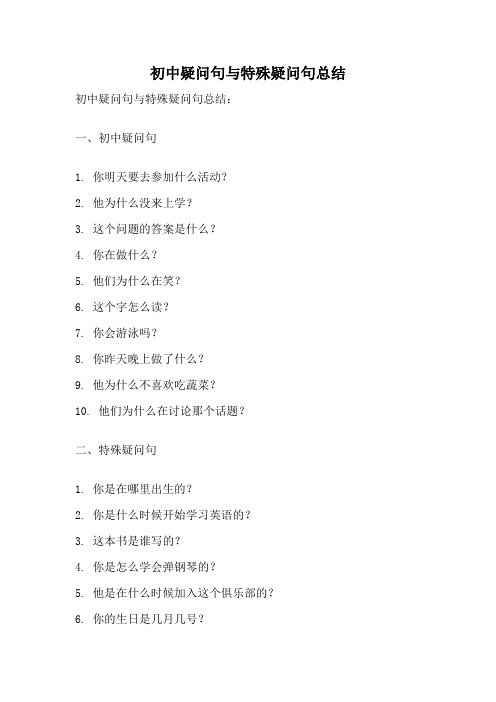
初中疑问句与特殊疑问句总结初中疑问句与特殊疑问句总结:
一、初中疑问句
1. 你明天要去参加什么活动?
2. 他为什么没来上学?
3. 这个问题的答案是什么?
4. 你在做什么?
5. 他们为什么在笑?
6. 这个字怎么读?
7. 你会游泳吗?
8. 你昨天晚上做了什么?
9. 他为什么不喜欢吃蔬菜?
10. 他们为什么在讨论那个话题?
二、特殊疑问句
1. 你是在哪里出生的?
2. 你是什么时候开始学习英语的?
3. 这本书是谁写的?
4. 你是怎么学会弹钢琴的?
5. 他是在什么时候加入这个俱乐部的?
6. 你的生日是几月几号?
7. 这个地方有多远?
8. 你是怎么学会滑冰的?
9. 他是从哪里认识你的?
10. 这个电影是在哪个城市拍摄的?初中疑问句与特殊疑问句总结完毕。
闽教英语疑问句总结
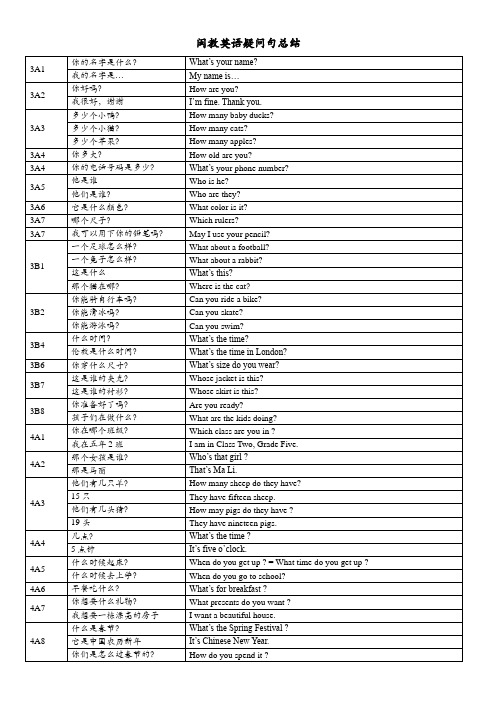
4A6
早餐吃什么?
What’s for breakfast ?
你想要什么礼物?
4A7
我想要一栋漂亮的房子
What presents do you want ? I want a beautiful house.
什么是春节?
What’s the Spring val ?
4A8
它是中国农历新年
你能骑自行车吗?
Can you ride a bike?
3B2
你能滑冰吗?
Can you skate?
你能游泳吗?
Can you swim?
什么时间?
3B4
伦敦是什么时间?
What’s the time? What’s the time in London?
3B6
你穿什么尺寸?
What’s size do you wear?
那个女孩是谁?
4A2
那是马丽
Who’s that girl ? That’s Ma Li.
他们有几只羊?
How many sheep do they have?
15 只
4A3
他们有几头猪?
They have fifteen sheep. How may pigs do they have ?
19 头
多少个苹果?
How many apples?
3A4
你多大?
How old are you?
3A4
你的电话号码是多少?
What’s your phone number?
他是谁
3A5
他们是谁?
Who is he? Who are they?
3A6
它是什么颜色?
- 1、下载文档前请自行甄别文档内容的完整性,平台不提供额外的编辑、内容补充、找答案等附加服务。
- 2、"仅部分预览"的文档,不可在线预览部分如存在完整性等问题,可反馈申请退款(可完整预览的文档不适用该条件!)。
- 3、如文档侵犯您的权益,请联系客服反馈,我们会尽快为您处理(人工客服工作时间:9:00-18:30)。
疑问句英语中有四种疑问句:一般疑问句、特殊疑问句、选择疑问句和反意疑问句。
一、一般疑问句(要用yes或no来回答):Is it a car ? Yes, it is .\No, it isn’t . Is this your ruler ? Yes, it is .\No, it isn’t . Don’t you like bananas ? Yes,I like bananas. \ No, I don’t like bananas. Can you speak chinese ? Yes , I can. No,I can’t二、特殊疑问句What is this ? It’s a tiger. How old are you ? I’m ten.What do you like ? I like playing footballWhat can you see ? I can see a cat.三、选择疑问句Do you like to play football or basketball?Shall we walk, or shall we go by bus?Are you male or female?四、反意疑问句He is a teacher, isn't? You can solve the problem, can't you?It’s cold today, isn’t it? He doesn’t like it, does he?1、陈述部分的主语是I,疑问部分要用aren't I 。
I'm as tall as your si ster,aren't I?2、陈述部分的谓语是wish,疑问部分要用may +主语。
I wish to havea word with you, may I?3、陈述部分用no, nothing, nobody, never, few, seldom, hardly, rarely, little等否定含义的词时,疑问部分用肯定含义。
The Swede made no ans wer, did he / she? Some plants never blown (开花), do they ?4、含有ought to 的反意疑问句,陈述部分是肯定的,疑问部分用shouldn' t / oughtn't +主语。
He ought to know what to do, oughtn't he? / shou ldn't he?5、陈述部分有have to +v. (had to + v.),疑问部分常用don't +主语(di dn't +主语)。
We have to get there at eight tomorrow, don't we?6、陈述部分的谓语是used to 时,疑问部分用didn't +主语或usedn't +主语。
He used to take pictures there, didn't he? / usedn't he?7、陈述部分有had better + v. 疑问句部分用hadn't you? You'd better read it by yourself, hadn't you?8、陈述部分有would rather +v.,疑问部分多用wouldn't +主语。
He wou ld rather read it ten times than recite it, wouldn't he?9、陈述部分有You'd like to +v. 疑问部分用wouldn't +主语。
You'd like t o go with me, wouldn't you?10、陈述部分有must 的疑问句,疑问部分根据实际情况而定。
表示“应该”:You must work hard next term, mustn't you ?表示“必须”:They must finish the work today, needn’t they?表示“禁止”:You mustn’t stop your car here, must you? (may we?)表示“推测”:You must know the answer to the exercise, don't you? That must be your bed, isn't it?You must have told her about it, haven’t you?She must have read the novel last week, didn’t she?11、感叹句中,疑问部分用be +主语。
What colours, aren't they? Wh at a smell, isn't it?12、陈述部分由neither…nor, either…or 连接的并列主语时,疑问部分根据其实际逻辑意义而定。
Neither you nor I am engineer, are we?13、陈述部分主语是指示代词或不定代词everything, that, nothing, this, 疑问部分主语用it。
Everything is ready, isn't it?14、陈述部分为主语从句或并列复合句a. 并列复合句疑问部分,谓语动词根据邻近从句的谓语而定。
Mr. Smith h ad been to Beijing for several times, he should have been in China now, shouldn't he?b. 带有定语从句,宾语从句的主从复合句,疑问部分谓语根据主句的谓语而定:He is not the man who gave us a talk, is he?He said he wanted to visit Japan, didn't he?c. 上述部分主句谓语是think, believe, expect, suppose, imagine等引导的宾语从句,疑问部分与宾语从句相对应构成反意疑问句。
I don't think he is bright, is he?We believe she can do it better, can't she?但此时主语必须是第一人称如果不是则不能否定从句如He thought they were wrong,didn't he?而不能说weren't they?15、陈述部分主语是不定代词everybody, anyone, somebody, nobody, no one等,疑问部分常用复数they,有时也用单数he.Everyone knows the answer, don't they? (does he?)Nobody knows about it, do they? (does he?)16) 带情态动词dare或need的反意疑问句,疑问部分常用need (dare ) +主语。
We need not do it again, need we ?He dare not say so, dare you/he?当dare, need 为实义动词时,疑问部分用助动词do + 主语。
She doesn't dare to go home alone, does she?17、省去主语的祈使句的反意疑问句,疑问部分用will you。
Don't do that again, will you?Go with me, will you / won't you ?注意:Let's 开头的祈使句,后用shall we(或用shan't we) ?Let us 开头的祈使句,后用will you(或won't you)?Let's go and listen to the music, shall we(或用shan't we)?Let us wait for you in the reading-room, will you (或won't you)?18、陈述部分是"there be"结构的,疑问部分用there省略主语代词。
There is something wrong with your watch, isn't there?There will not be any trouble, will there?19、否定前缀不能视为否定词,其反意疑问句仍用否定形式。
It is impossible, isn't it?He is not unkind to his classmates, is he?20、当陈述句的主语是everyone, everybody, someone, somebody时,简短问句中的主语通常用they。
如果陈述句的主语是非人称的复合词,如eve rything, something, anything, 则简短问句中相应的人称代词是单数的中性词it。
例如:Somebody borrowed my coat yesterday, didn’t they?Nobody came, did they?Everyone thinks they’re the center of the universe, don’t they?Nothing can stop us now, can it?21、如果陈述句的谓语动词是have (当“拥有”讲时), 简短问句可用have 形式或用do形式。
例如:You have a nice house, haven’t/don’t you? 但如果陈述句是否定形式时,简短问句中动词的选择则由陈述句中的动词形式而定。
如:He hasn’t a house of his own, has he? He doesn’t have a house of his own, does he?如果陈述句中的动词have 表示“经历,遭受,吃”的意思时,则简短问句中的动词用do的形式。
如:You often have headaches, don’t you?1-9:did you ? \ had you? hasn’t he, \ doesn’t he?don’t we ? don’t you?doesn’t he?isn’t it?weren’t they?will you?10-17:shall we? \ can we? will you? \ won’t you will you? ? will you? won’t he?will he? did he? usedn’t h e \ didn’t he? 18-35:oughtn’t he doesn’t he?isn’t it?can one \ can he? doe sn’t it?doesn’t he \ don’t they?hasn’t it?isn’t it?isn’t he? needn’t we?isn’t he?didn’t it?hasn’t he?aren’t I ?has he?一、将下列句子变成一般疑问句1 Mr Wang is thirsty __________________________?2.The elephent’s ears are long __________________________?3. We like birds _________________________?4.Hello.You are his mother __________________________?5.I can sing and dance. ___________________________?二、将下列每组词各组成一句特殊疑问句1.(you are how). _________________________?.2.(old how Ben is)_________________________?3.colour is what your shirt_________________________?4.(can see what the on you desk ) ________________________?5.(like what do you)_________________________?三、将下列句子变成反意疑问句1、You had no time for reading, ______________?2、He has a brother, ______________?3、We have to go without him, ______________?4、You have your dinner at school, ______________?5、He has a rest every two hours, ______________?6、This is your last chance to learn from the beginning, ______________?7、Those were terrible days for us to recall, ______________?8、There are some books you are interested in,______________?9、Let us do it as we please to, ______________?10、Let’s us do it right now, ______________?11、Come here, ______________?12、Don’t say anything,______________?13、Tom, you clean the window, ______________?14、I think \ say \suppose \ guess \ am sure he will come back soon, _____?15、I don’t think he will com e back , ______________?16、He old man never thought he was lonely, ______________?17、The old man used to be a farmer, ______________?18、He ought to come, ______________?19、He seldom( hardly, never, few, little) goes to the cinema, _______?20、It’s unf air, ______________?21、One can’t be careful enough, ______________?22、Everything goes well, ______________?23、Everybody agrees with him, ______________?24、All we needed has been bought, ______________?26、Learning English is very hard, ______________?27、He studies hard and he is often praised by his teachers, ______?28、We must be more polite in this occasion, ______________?29、He must be a brave man, ______________?30、It must have rained last night, ______________?31、He mush have known the answer, ______________?33、I am a student, ______________?34、So he has known the secret, ______________?四、选择正确的单词填空(who, where, when)1._____ is that pretty girl? She is my sister.2._____ are Jack and Tom? They are behind you.3._____ do you go to school? I go to school from Monday to Friday.4._____ has a beautiful flower? John has a beautiful flower.5._____ are they? They are my parents.6._____ is my mother? She is in the living room.7._____ are you going? We are going to the bakery(面包坊).8._____ do Jim and Wendy play ball? They play ball in the afternoon.9._____ does he jog? He jogs in the park.10._____ are you from? I‘m from Changchun city.五、就画线部分提问1.He is my father.2.They are under the tree.3.I often watch TV after dinner.4.Lily swims in the swimming pool.(游泳池)5.Superman flies in the sky.6.I often brush my teeth in the evening.7.Alan likes to play with Bill.8.Joe‘s father plays badminton(羽毛球) every weekend.9.The supermarket is near the school.10.The laptop(笔记本电脑) is on the table.11.Jennifer has a pair of earrings(耳环).12.The flowers are in the flower pot(花盆).13.My grandpa took us to the zoo.14.I put the gold fish(金鱼) into the fish tank(鱼缸).15.The monkey sleeps at night.六.用what time, what color, what day, what填空。
